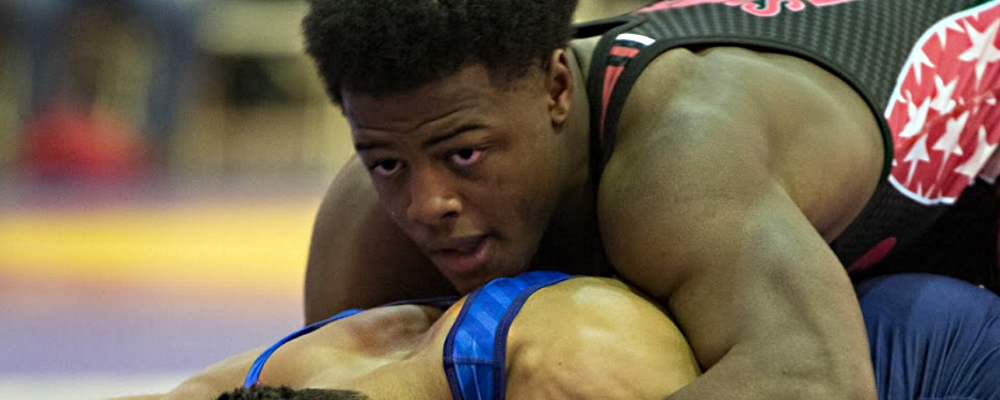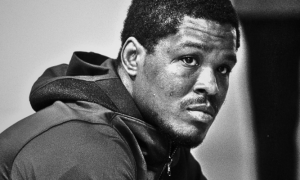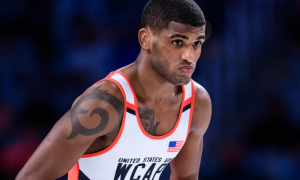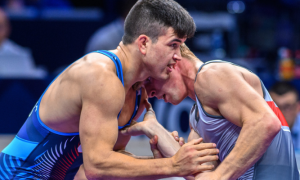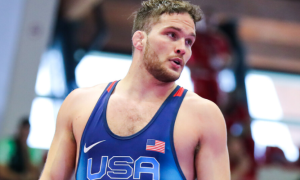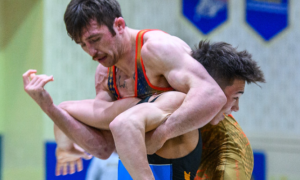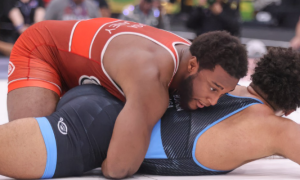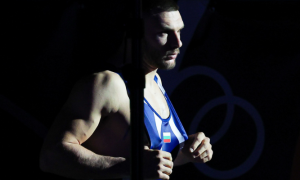Out of the hundreds of US Greco Roman matches which took place throughout the year, it is obviously a difficult task to go through each one, especially when you throw in the dozens contested overseas in various tournaments. There have been so many big moments, exciting come-from-behind wins, and triumphant signature performances that to even compile this list was overwhelming. That’s why we had to simplify the process. To make it on here, matches had to feature at least one US athlete and have the capability to be shared publicly. So even if it was some heart-pounding barnburner, if the video is unavailable for the masses, that match won’t be found here.
It is also worthy to note that a particular bout did not have to have a close score or produce a desirable outcome. Some were considered simply for their potential significance in an athlete’s career. Others because they were exciting to watch. These parameters (much like passivity) are subjective so if you disagree with some of the selections, feel free to let us hear about it!
Top 10 US Greco-Roman Matches — 2016 Edition
10. Joe Rau (Minnesota Storm) vs. Davi Jose Albino (BRA) — 98 kg bronze medal match, Pan Am OG Qualifier
One of the more important matches of Rau’s career to date for a couple of reasons. First off, think of the match before this. Rau gets headlocked and pinned by Yasmany Lugo Cabrera (CUB, who also eventually went on to claim silver in Rio) in the semifinals of a tournament he had to make the finals in order to qualify the weight for the Olympics. Rau is then moved into the bronze medal bout and is called upon to step it up against Albino, a tough wrestler. Not the best guy Rau has ever faced, but a wrestler who has owned his weight class in his native Brazil and has some decent placings at other events. And Rau virtually mauled him.
Maul might be a strong word. After all, Rau didn’t have much going on for the first period. He was trying. The guy always tries. But there wasn’t a spark just yet, maybe because he was still a little letdown or maybe, because Albino isn’t himself a ball of energy. Depends on how you see it. Rau had no choice but to keep plugging along and try to find some way to crack this thing open. It was tough sledding in the opening frame. Sometimes it takes a nice jolt, which is what Rau got in the second when he took par terre top.
Whether or not Albino was legitimately injured or simply gassed is besides the point. The American had begun chipping away before that. Rau, after being down 2-1, locked a trap-arm gut and just rolled and re-rolled until enough was enough. Rau could have rolled it over 20 times, Albino wasn’t going anywhere. Rau could have whispered screenplay ideas in the man’s ear for all it mattered, he had that much control over him.
The truth is, Rau had more scintillating matches with Caylor Williams (Army/WCAP) in the Olympic Trials finals. For sure. Even coming back from similar circumstances to take the back two of that series. But this bout here, for third place at an event where a bronze medal is hardly a consolation, Rau made the most of it and showed he had something in him. You can’t ask more of an athlete than that.
9. RaVaughn Perkins (NYAC) vs. Patrick Smith (Minnesota Storm) — 66 kg finals, Match 3– Match 3, US Olympic Trials
66 kilos was a stacked weight at this year’s Trials, so you knew whoever came out alive at the end of the day was going to deserve it. Smith had an incredible day and so did Perkins, with each one competing in tense semifinals matches leading up, though Perkins’ win over Coleman had more drama to it than Smith/Hooker perhaps. Whatever. You have to dismiss all of that because the first two matches in this series didn’t disappoint. Smith won the first bout 2-0 on two step-out points and seemed on his way late in the second before Perkins skated through on a caution.
They were neck and neck. A contrast of styles grounded in similar skill levels. Smith, forever the technical aggressor and iron-tough competitor. Perkins, the wiry, smooth warrior who does some of his best work when his back is firmly planted against a wall. It wasn’t as if these two wrestlers were made for each other, but they both brought out the best in one another, at least for one evening in April. This one would come down to inches, which is what makes the outcome extraordinary for one, and excruciating for the other.
The third and final bout saw Perkins take advantage of his first par terre opportunity and bring to life his “daddy long-legs gutwrench” to turn Smith twice. Smith closed the gap to 4-2 in the second period because he, too, fights like a man possessed when the ceiling is falling. But that is also when the bottom fell out for the Minnesotan.
After selecting par terre top, Smith locked around Perkins to lift him. As he got him up near the edge, Perkins swiveled his hips and reverse-half’ed Smith’s head and landed on top for a stunning four points. The Storm side challenged and lost to increase the deficit to 9-2, which would be the final score.
While undoubtedly a crushing loss for Smith, he has rebounded since with a strong showing at the Clubs Cup and last but not least, his first US Senior National title two weekends ago. The bout proved especially important for Perkins. Though he would wind falling short of qualifying the weight for the Olympics, he engineered a breathtaking run at the 1st OG Qualifier in Mongolia, earning bronze with a 4-2 ledger that saw some of his best wrestling to date. He is currently healing a fracture in his lower back and should return sometime in early 2017.
https://www.youtube.com/watch?v=4YSnRPRiBiI
8. Alec Ortiz (Minnesota Storm) vs. Dillon Cowan (Army/WCAP) — 75 kg quarterfinal, US Greco Roman Nationals
When a match ends with a “football score”, you know it’s a great one. It is certainly worthy of being one of the top 2016 US Greco Roman matches, that much is certain.
For the uninitiated, Ortiz is positively one of the most exciting wrestlers in the country. He’s probably one of the most exciting wrestlers in the world and hopefully we get to see him face off against some international competition eventually just to prove the theorem. Cowan is also not boring by any stretch (obviously), but he is more of a set-traps kind of technician. He also entered into the Nationals as a very serious contender, but then he ran into the fireballer that is Ortiz and welp, plans were changed.
Cowan started this one off in the driver’s seat. He forced Ortiz out twice in the first 15 seconds and nabbed two more when he took Ortiz to the plank again, only that time it was a takedown since Ortiz’s hands touched down.
This all apparently got under Ortiz’s skin just a little bit and to give him credit, he really knew what to do with his frustration. Because when the action re-started, he tossed Cowan over with back-to-back front headlocks that appeared tight enough to loosen the lug nuts on an ’79 Ford Bronco. Cowan got free to reverse position and transitioned to a gutwrench. The score after all the chaos was 8-7 for Ortiz and the bout wasn’t even a minute old yet.
Ortiz managed to find himself yet another front-head position, but this time he spun around and gutted Cowan over. They stood back up, Cowan unleashed one of his wicked arm throws, Ortiz got loose and wound up on top. He then proceeded to gut Cowan over twice. At the conclusion of the first period, the score was 18-11, Ortiz. 29 points. 29!
Cowan opened up the second with a step-out point and then barrel-rolled an Ortiz front headlock attempt for two more to give him 14 and a surmountable (for this match, anyway) three-point deficit, as Ortiz came out on top of Cowan in the exchange. But that would have been under the assumption Ortiz was done. He wasn’t, for yet another front headlock allowed him to collect two more points to extend the lead to 21-14.
The point-scoring party was done there. With only under half a minute remaining, Cowan was spent and Ortiz couldn’t find any more excuses to twist his neck off. But yikes. Watch this one, specifically the first period. It’ll restore your faith in the sport and perhaps, humanity itself.
7. Kamal Bey (Sunkist) vs. Karim Hawash (NYAC) — 75 kg final, Bill Farrell Memorial/NYAC Open
Bey earned his first Senior gold by winning this match, which in and of itself is notable considering his age and perceived trajectory. That he had a legit opponent in Hawash in the finals of a tournament he dominated up to that point only serves its importance even more.
The thing about Bey is that while he still lacks some of the subtle nuances and overall polish more experienced wrestlers possess, it does not deter him from trying to find ways to score. It basically works like this: However he can manage to grab you is more than enough for him to figure the rest out. It also helps that he actually does boast incredible wrestling instincts, but the willingness to try anything at anytime is what has set him apart thus far and it’s on full display here.
At the whistle, Bey walked right into a Hawash headlock, trailing immediately by four points. He recovered, picked up two of his own and then what happened next is all pretty much a blur. Bey sneaked around Hawash for two more, only to be reversed. But then as Hawash was attempting to keep his lock and turn him, Bey stepped over and caught Hawash on his back. After the melee, it was 6-5 Bey and he wasn’t through yet.
Double-overhooks, one of Bey’s go-to positions, presented itself and he took full advantage by torquing Hawash to his back yet again. 10-5. Down by five against a frenetically-moving Bey, Hawash had little choice but to get moving. He did so by trying to come in off of a high-dive. Bey caught the attempt with underhooks and dumped it right over for four more. Tack on another point due to the denied challenge by the NYAC corner and it all added up to a 15-5 technical fall with all 20 points coming in the first period.
This is what Bey brings to the table, folks.
6. Hayden Tuma (Army/WCAP) vs. Ryan Mango (Army/WCAP) — 59 kg final, US Greco Roman Nationals
This could have been so great.
The roles in this film just about defined themselves. Mango, the otherworldly talent who is right on the cusp of hitting that stage of progression where he could potentially take over a weight class. Tuma, the bigger, younger hotshot down a weight class with miles of ability in his own right but still maybe not quite ready for the spotlight.
That whole narrative was shot down in a hurry, wasn’t it?
Mango’s talent hasn’t gone anywhere, but Tuma’s stock has risen to epic heights following this statement-making win. There was no long, drawn-out nailbiting back-and-forth clash. No tension-filled moments as the timer counted down. No questionable challenges, no idiotic passivity calls. None of it. Just a quick fireworks show and then “peace out.”
The match was over before a reasonable sweat could have been worked up. Tuma lollipopped Mango over with a lateral and then before Mango could recover, he locked, lifted, and dumped him again, this time for five. Two throws and nine points later, every 59 kilo guy in America was given one heck of a wake-up call.
5. G’Angelo Hancock (NYAC) vs. Giorgi Melia (GEO) — 96 kg semifinal, Junior World Championships
With the astounding year Hancock has had, it might be odd to see him on this list for a match he lost. But what a match it was.
Hancock stormed into the Junior Worlds on quite a streak. The last time he lost a bout before France was at the Olympic Trials to Caylor Williams, for crying out loud. After that he was practically unbeatable at the age-group level, winning the Junior Trials, the Junior Greco World Duals, and the University Nationals/Trials. Needless to say, his second trip to the World Championships was a highly-anticipated one.
Right away, Melia tossed Hancock with a headlock for four. Hancock popped out and came around to pick up a point and the bout was at 4-1 in the opening 23 seconds. After they got re-acquainted, Melia locked up double-overhooks. Hancock countered and landed on top of Melia — 4-3, Georgia. Hancock then locked and lifted for two — 5-4, Hancock. Following another re-set, Melia once again went to his double-over’s only this time, he made it happen and arched Hancock down for four. 8-5, Melia. See a pattern developing yet?
Melia was going to live and die by double overhooks and went to the position for a third time. Once again, Hancock got his weight settled just enough to wind up on top to close the margin to 8-7. The first period ended with 15 combined points and included three throw attempts by Melia, one by Hancock, and two lead changes.
The second period, unfortunately, did not live up to the pace of the first. Melia whipped another headlock to go up five before Hancock got a point back via passivity. The remainder of the bout was more or less defined by both athletes pummeling for position and no other points were scored. It was a 12-8 loss for Hancock, but he rebounded with a 3-0 win in his next match to earn his first World bronze. For his part, Melia won the whole thing. That first period, though? It was like this tournament’s Hagler-Hearns and absolutely gives it enough juice to be included here.
4. Andy Bisek (Minnesota Storm) vs. Geordan Speiller (Florida Jets) — 75 kg finals, Match 2, US Olympic Trials
To be honest, their 2014 Open dust up was a much more exciting bout.
However, Bisek/Speiller Match 2 from the Trials checks other boxes. For starters, it’s as much of a virtuoso performance as you will ever see from a guy who is/was the best wrestler in the country in the most important match of his life up to that point. When you have two World bronze medals in the two years preceding the Olympic year, there are expectations. Pressure. Drama. Sacrifice. There’s confidence, too, no doubt about it. Bisek had defeated Speiller a couple of times before the Olympic Trials and took the first bout in the finals series 6-0 via his “I’d rather die than be squeezed like this” gutwrench.
What makes this bout (and even the one before it) particularly interesting is Bisek’s preparation. Speiller is not a good athlete — he’s an incredible athlete. He has consistently found creatively dynamic ways to translate his folkstyle strengths to help turn him into a perennial contender. And he’s only 24. One of Speiller’s most reliable weapons is his duck-under, which he has used to find high-dives and throws to great success. Including against Bisek in 2014. Bisek shored that up for the ’15 Schultz and by the time Iowa City hit this year, he just couldn’t be touched.
Bisek was awarded the first passivity par terre opportunity and though it required some extra effort, he rolled and arched Speiller over for the bout’s first two points. Two more would follow when Bisek worked a lock on Speiller at the boundary that Speiller touched down on.
By the second period, Speiller was going for duck under’s as if he was dodging machine gun fire. Just repeatedly dropping in on Bisek, who was so stoic and ready, it looked almost like Speiller was getting them in simply for the cardio benefit. It was airball after airball, he didn’t come close. Meanwhile, Bisek expertly cinched up two-on-one’s, drags, and short underhooks to not only stay out of danger but also, perhaps set up another window to do some damage. The score was only 4-0 but it felt more like 7-0. That’s dominance, and Bisek demonstrated it
Currently, it is at least assumed this was Bisek’s last win inside of the US. It might be, it might not be. That part doesn’t matter right this minute. What does, is that this match is the one that put him in the Olympics and the level of control he displayed over a top-notch opponent in what had to be intense circumstances was jaw-droppingly impressive.
https://www.youtube.com/watch?v=03pVXrBTbdk
3. Patrick Martinez (NYAC) vs. Arkadiusz Kulynycz (POL) — 80 kg quarterfinal, Pytlasinski Open
How the “Lone Wolf” was born.
Martinez, in his quest to become one of the best on the planet and not just his country, scraped together some funds and got himself over to Poland for the Pytlasinski Open, a traditionally tough tournament that takes place each summer. Himself. No one else. No teammates. Technically, there were no coaches either, aside from the fact Valentin Kalika was going to be there anyway. So, yeah. He had that going.
A rent-a-car mishap and 90 minute journey from the airport (plus a camp in the week prior) led to Martinez sending a serious message to anyone willing to pay attention: He was for real and it’s only just the beginning.
Martinez wound up with a bronze medal at this tournament, but it was no breezy stroll around the gymnasium. In fact, he was well on his way to losing in the opening round. Kulynycz, you have to remember, is really good. He was a Junior World bronze some years back, has placed at some fairly big events throughout his Senior career, and is basically just a tough, durable dude who looks like he could very well one day land the part in the next Robocop re-boot. So this wasn’t just a “decent international opponent.” No, Kulynycz has legit ability with a solid resume to back it up.
The Polish wrestler had himself a 4-1 lead after a first period that was pretty much a master class in inept officiating. Two challenges added up to nine minutes of inactivity. Just brutal. At any rate, Kulynycz collected his four thanks to a takedown off of a counter and a gutwrench. Martinez got his on a passive call. The action wasn’t hectic. It wasn’t plodding, either. Martinez prowled in with his wide stance dinosaur-arming inside and Kulynycz more or less answered back with choppy pummels to underhooks.
The second period was playing out similarly to the first sans scoring sequences. It started to have the look of a nondescript 4-1 loss for Martinez, especially when the clock was reduced to a minute left. And then 30 seconds left. And then 15 seconds left.
With just :10 remaining, Martinez lowered into a high-dive and bodied Kulynycz directly to his back. The four points provided the Cali native with the lead, which he had zero trouble holding onto considering he was planted right on top of Kulynycz as time ran out.
It might not be the biggest win of Martinez’s career. But down by three with under ten seconds left against a seasoned opponent at an international event by yourself? That’s rock star stuff.
(Fast forward to 1:27:40 to see Martinez’s match with Kulynycz)
2. Taylor LaMont (Utah) vs. Oleksandr Hrushyn (UKR) — 60 kg bronze medal match, Junior World Championships
After coming close to earning a World medal as a Cadet last year, LaMont got enough of a taste to know he wanted more. So he did the most reasonable thing he could think of — put in the work necessary to make it happen.
LaMont tore through the Junior World Team Trials and then spent the next few months building towards a trip to the podium at France’s World Championships. He also dished out a few beatdowns in Fargo in between. LaMont, all of 18 years of age, was razor-sharp in Macon. Outside of a narrow semifinal loss to one of Germany’s brightest prospects and 2013 Cadet World champ Etienne Kinsinger, there was no instance in any other bout where it didn’t seem like he was the better guy on the mat.
Things changed for a little while there in the battle for bronze, though. Hrushyn jumped out to an early 3-0 lead on a passivity point and takedown. He also had LaMont briefly caught up in a trap-arm gut that LaMont wriggled free of. The Ukrainian looked quick on his feet, darting in on ties and dictating the tempo. Lamont appeared to perhaps be the stronger of the two; he was turning back Hrushyn’s advances with nary an issue as the first period wound down. But starting the second period down three is not necessarily the best spot to be in when a World medal is on the line.
The first chip came to LaMont via passivity. It wasn’t that Hrushyn was fading so much as it was LaMont getting going. The tie-ups were fairly neutral, but LaMont began being the one asserting control when the exchanges would break apart. Despite the uptick in LaMont’s output, time was becoming a problem and another passivity point wasn’t going to help.
Then it struck.
With a minute to go in the match, LaMont slid Hrushyn by for a takedown to take a 3-3 criteria advantage. But the lead was not safe. There was still plenty of time for a passivity call to ruin everything and with Hrushyn in desperation mode, it seemed plausible. Thing was, Hrushyn was too desperate. Reckless, even. First it was a headbutt with ten seconds to go. Then it was a a leopard jump at the whistle following that warning. The officials called it a caution-and-two and with only a few seconds left, LaMont sealed up a 5-3 come-from-behind-medal-winning victory that he’ll always remember.
1. Jesse Thielke (NYAC) vs. Donior Islamov (MDA) — 59 kg semifinal, 2nd OG World Qualifying Tournament
Leading up to the semifinals, Thielke was in two other matches that could have easily been considered on a list of the top”2016 US Greco Roman Matches of the Year.” The first was against 2012 Olympic silver medalist Revaz Lashkhi (GEO). Thielke was up six in that bout in the second period before Lashkhi responded with three guts to tie it up. Thielke then went on to score seven unanswered points to put it out of reach at the end. Remember the phrase “unanswered points” for later.
The other was in his next match against Frunze Harutyunyan (SWE). Down by two in the second period and flattened out to avoid being turned/lifted, Thielke exploded up and basically hit a wrestler’s switch to put Harutyunyan on his back. A fall was called and bam, Thielke was in the semis.
Now, Thielke HAD to make the finals to qualify 59 kilos for the Olympics. Nothing else would get it done. Throw in that Perkins and Rau both were out of the running by now and the US was in danger of sending only three athletes to Rio, and you get a sense of what this match meant not only for Thielke, but for the program, as well. Something had to come from this. Thielke defeated two prior Olympic medalists (Thielke defeated 2012 Olympic bronze medalist Peter Modos of Hungary in his first match of the day via tech) along with Harutyunyan to set the tone, making the prospect of falling short here devastating.
And it seemed to be trending in that direction at the start.
Islamov unfurled a sick arm throw to break the ice. It was beautiful, no other way to say it. He even stayed attached — attached enough to attempt a reverse lift that Thielke countered by standing up and bodylocking him off the edge. 4-2, Islamov. Once the pair returned to the feet, Thielke wrested a two-on-one and forced Islamov out for another point. After they reset Islamov whipped out his second four-point arm throw to jump ahead big-time 8-3. This is all within the first two minutes of the match.
Thielke quickly got two back. Then the rampage began.
Just as the period was coming to a close he bodylocked Islamov, drove him towards the boundary, and clasped around on a gutwrench for a four-point sequence that put him in the lead. It was 9-8 and Thielke was all red pill from there on out.
The whistle blew for the second frame and instantly, Thielke clashed into Islamov and threw him for four. 13-8. Of course, this is Thielke wrestling, so there is no noticeable change in demeanor. Yet. Like he had a chip implanted that Lindland or Momir decided to activate once the time was right. Watching this live, you weren’t fearful of more Islamov arm throws because even if he managed to grab one, it wouldn’t matter because Thielke was going to score again. That’s what it felt like.
Islamov did his letter-best to deal with the assault. He started trying to bully in, to twist and torque his way to an opening. Thielke was given a warning, just because they have to do that every now and again. No big deal.
Thielke broke away from a tie-up that spun Islamov around. When the Moldavian turned to re-engage, Thielke was in on a high-dive that he converted to a gutwrench as he coerced Islamov to the mat. Four more points, 17 altogether, 14 unanswered, and a nine-point margin. They stop these things when it’s an eight-point differential. Saying Thielke punched his way to the Olympics is an understatement. It was more like he used a rocket launcher to blast his way in.

Notice: Trying to get property 'term_id' of non-object in /home/fivepointwp/webapps/fivepointwp/wp-content/themes/flex-mag/functions.php on line 999

